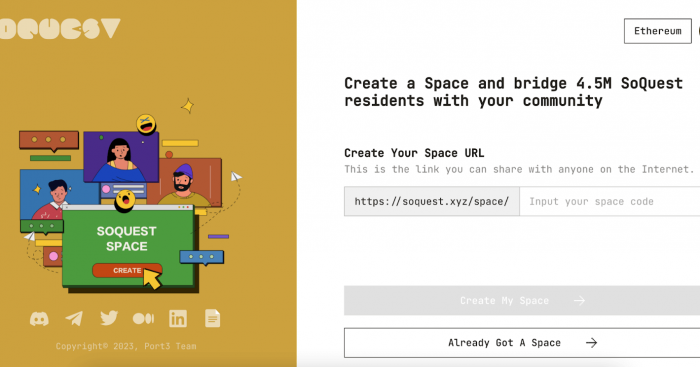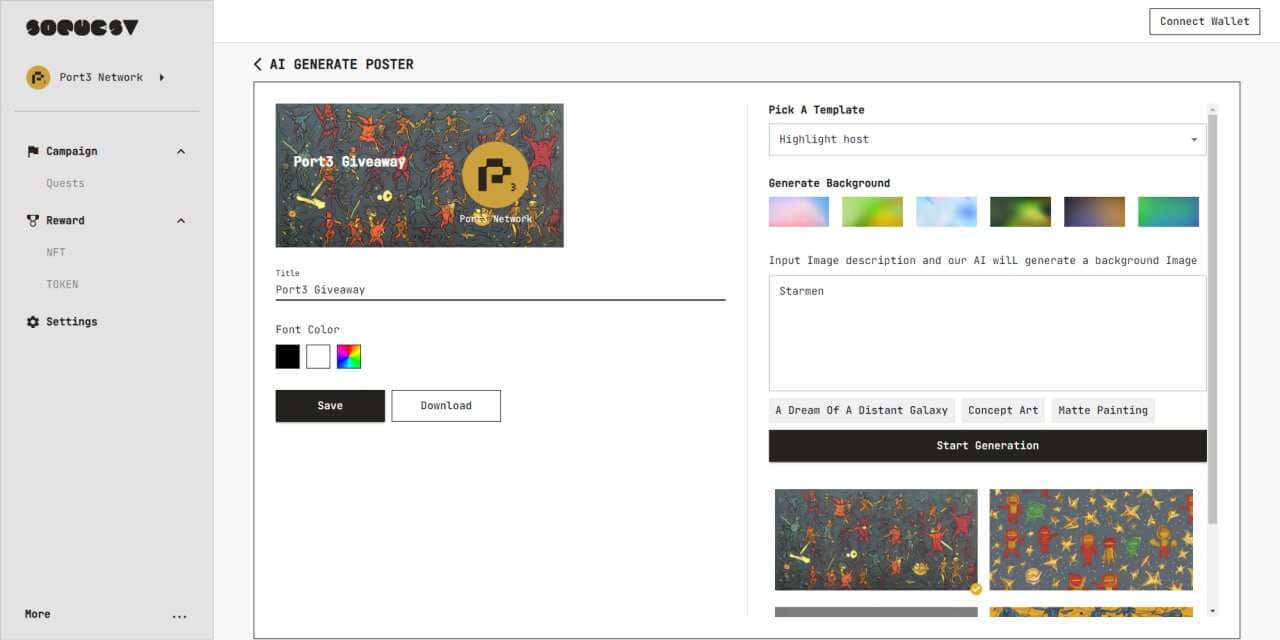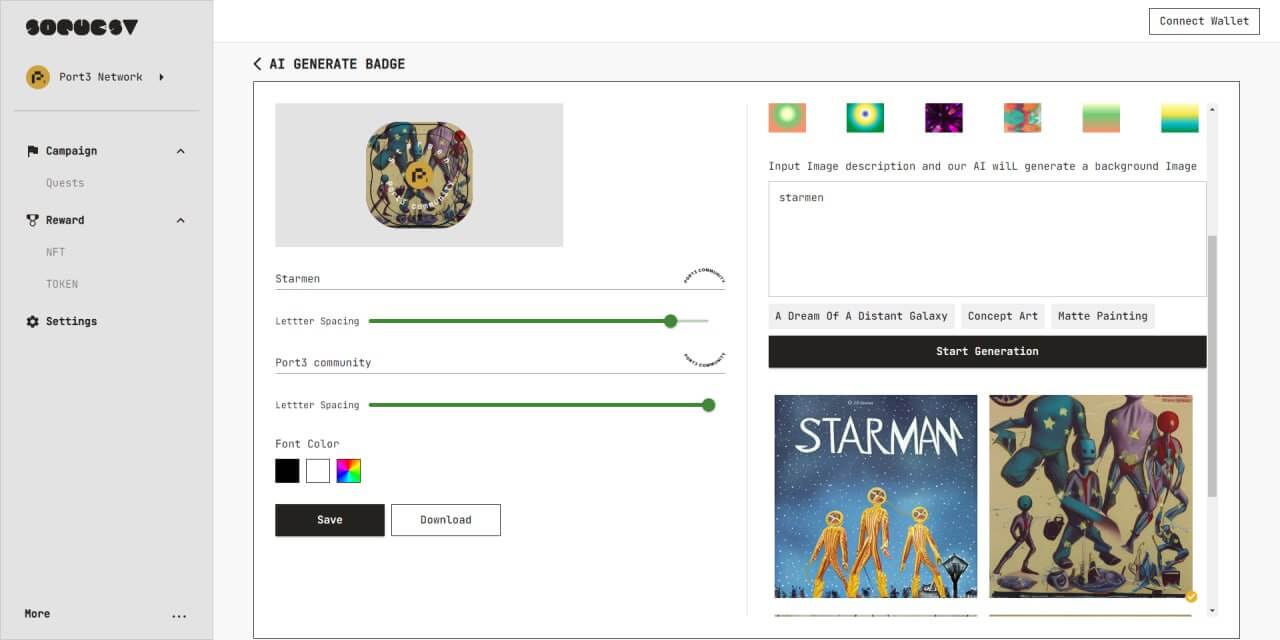SoQuest by Port3 network integrates AI technology for enhanced Web3 experience

Disclaimer: This is a sponsored press release. Readers should conduct their own research prior to taking any actions related to the content mentioned in this article. Learn more ›
Artificial Intelligence (AI) is the field of computer science that deals with creating intelligent machines capable of performing tasks that typically require human intelligence, such as learning, problem-solving, and decision-making. Over the last decade, AI has grown to become one of the most significant technological advancements, with its applications spreading across various industries such as healthcare, finance, retail, and many more.
In recent years, the integration of AI technology has become a trend, especially in the tech industry, with many companies incorporating it into their products and services to enhance customer experience and streamline business processes. AI-powered chatbots, for instance, have become increasingly popular in customer service, where they provide instant and personalized responses to customers’ queries, saving companies time and resources.
OpenAI, a leading AI research organization, has been at the forefront of driving the development of AI technologies. It has made significant contributions to the field, including the development of the GPT language model, which is widely used for natural language processing and other AI applications.
Port3 Network, a dynamic Web3 development company that is always on the cutting edge of innovation, has taken the bold step of incorporating AI technology into its latest product, SoQuest. This integration promises to revolutionize the Web3 experience and take it to a whole new level. In this article, we’ll dive deep into the incredible ways that Port3 Network’s SoQuest is leveraging AI technology to create an unprecedented user experience and how this move has the potential to affect the whole blockchain industry.
AI in Web3 use cases
With the growing popularity of Web3 technologies, there has been an increased interest in integrating AI into the Web3 space. AI is becoming an essential tool in the development of Web3 applications, helping to improve the user experience and create innovative solutions for decentralized platforms.
AI technology can be used in several ways in the Web3 industry, including data analysis, user profiling, and predictive modeling. AI algorithms can analyze vast amounts of data generated by decentralized applications, providing valuable insights that can help developers make decisions.
One of the most significant use cases of AI in Web3 is the creation of decentralized autonomous organizations (DAOs). These are self-governing organizations that operate on a blockchain and use AI algorithms to make decisions automatically. By leveraging AI, DAOs can make decisions quickly and efficiently without human intervention, which can increase their overall efficiency and effectiveness.
Numerous companies in the Web3 ecosystem have integrated AI technology into their offerings. Arweave, a decentralized data storage platform, leverages AI to decrease the cost of data storage on its network. Additionally, there are other well-known global projects like Golem, a decentralized supercomputer that uses AI for machine learning tasks, and Ocean Protocol, which uses AI to provide secure and privacy-preserving data sharing on a decentralized network. Another example is Fetch.ai, which uses AI to create an autonomous economic system for decentralized finance (DeFi).
As the Web3 space continues to evolve, it’s clear that AI technology will play a crucial role in shaping its future. With several companies already implementing AI into their products and services, it’s essential to keep up with the latest trends and developments.
One company that’s leading the way in this space is Port3 Network, with their killer app, SoQuest. SoQuest is a quest platform like Gleam but for web3, it helps Port3’s grand vision of aggregating and standardizing both off-chain and on-chain data to build a social Data Layer for Web3 applications. What sets SoQuest apart from other solutions, among other features, is its integration of AI technology. By leveraging AI, SoQuest can provide users with personalized recommendations and insights, improving the overall user experience. In the next section, we’ll take a closer look at how Port3 Network’s SoQuest is utilizing AI technology and the benefits it brings to Web3.
SoQuest AI empowered by Port3 Network
SoQuest is a social data acquisition and standardization tool developed by Port3 Network for Web3 platforms. It helps aggregate and standardize both off-chain and on-chain data to build a social Data Layer that allows businesses to access valuable insights into user behavior and preferences. Recently, Port3 Network has launched the AI-empowered SoQuest. The new AI technology with a new dashboard promises to reach higher standards and expand its capabilities. Users will be able to describe what they want in the poster or badge, and the AI will take care of the rest. This exciting new feature will enable them to create more visually appealing and engaging decentralized applications.

Port3 Network has already presented itself as a game-changing solution for the Web3 space in the last months, and its integration of blockchain technology, social data, and AI technology is set to provide innovators with powerful tools to create cutting-edge solutions for decentralized platforms. The release of the AI-empowered SoQuest promises to further enhance the development process and push the boundaries of what’s possible in Web3.

The future of AI in Web3
As AI technology continues to advance, the potential for its impact on the Web3 industry is enormous. The integration of AI with blockchain technology and social data has the potential to revolutionize the way we interact with decentralized platforms.
One of the most significant potential impacts of AI in the Web3 market is the increased efficiency and automation of decentralized applications. AI-powered chatbots, for example, can handle customer service requests and inquiries, freeing up valuable time for developers and increasing user satisfaction. AI can also be used to optimize decentralized marketplaces, automatically matching buyers and sellers based on their preferences and behavior.
Another potential impact of AI in Web3 is the creation of new business models and revenue streams. With the ability to collect and analyze vast amounts of data, AI can provide valuable insights into user behavior and preferences so that businesses can make more informed decisions and develop new products and services.
However, the use of AI in Web3 also presents some potential risks and challenges. One significant risk is the potential for AI-powered systems to be manipulated or hacked, leading to the compromise of sensitive user data. Additionally, the use of AI in decentralized applications raises ethical concerns, such as the potential for biased decision-making and the misuse of user data.
As you can see, the future of AI in Web3 is promising, but it is essential to address the potential risks and challenges associated with its use. As the industry continues to evolve, it is critical to prioritize transparency, accountability, and ethical considerations in the development and deployment of AI-powered solutions.
Conclusion
In conclusion, this article has explored the role of AI in the Web3 ecosystem and its potential impact on decentralized platforms. The integration of AI technology into SoQuest by Port3 Network was discussed, highlighting the benefits it provides to the Web3 community. SoQuest’s AI-powered features refined user data, offering valuable insights into user behavior and preferences, enabling businesses to better iterate their products and services. While the integration of AI in decentralized applications presents opportunities for automation and increased efficiency, potential risks and challenges such as biased decision-making and data misuse are to be addressed. In summary, responsible deployment of AI has the potential to transform the Web3 space, creating more efficient and user-friendly decentralized applications.



 CryptoQuant
CryptoQuant 

































































